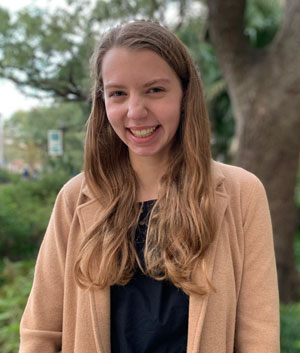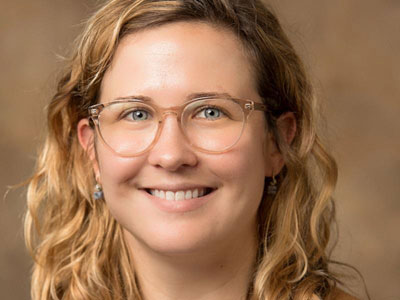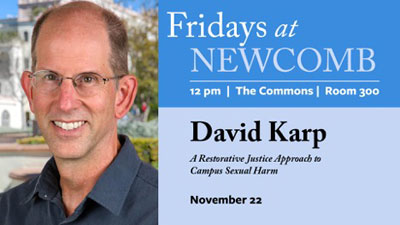Student Spotlight: Kate Kushner

I remember the feeling, 2 years ago as a first-year student learning about the climate survey results and feeling heartbroken. A sense of helplessness then turned to a mission: to make a meaningful mark on the Tulane community as a student leader in sexual violence prevention and response. This mission led me to join a class called Project IX and through it, I co-founded and developed the concept for Sex Week at Tulane. Sex Week is a week full of edgy, sex-positive events that aim to ignite an ongoing dialogue on safe sex, sexual assault, consent, healthy relationships, gender expression, and more. Taking inspiration from this original concept, I am working with The Well for Health Promotion as the first Sex Week Coordinator to highlight the incredible programming that already exists on this campus by supporting student initiatives and events to form Sex Week 2020.
Sex Week will bring together the campus community and a diverse set of programming to create a week of comprehensive, queer-inclusive, culturally-competent, sex-positive sexual health events and conversations. The programming will consist of lectures, workshops, social activities, educational materials, and installations around Tulane’s campus. We hope to bring together voices from all areas of campus life to join the conversation about sexual health and pleasure.
I empower my fellow students to think creatively about how to foster a culture of healthy sexuality on our campus. If you as a student or your student organization would like to get involved in Sex Week, please reach out to me at Kkushner1@tulane.edu. Let’s get ready to talk about sex!
Faculty Spotlight: Julia Fleckman

Dr. Julia Fleckman is an assistant professor at Tulane School of Public Health & Tropical Medicine. The primary focus of Dr. Fleckman's work is the prevention of violence. Dr. Fleckman’s experience has been focused in the field of violence prevention for the past 10 years through research and community-based programming. Her current emphasis is on understanding and evaluating mechanisms for the prevention of childhood exposure to violence and sexual violence. Much of her work contributes to better understanding the role of social norms, social supports, and community processes that influence behaviors, and how these factors can be influenced to improve well-being and reduce risk for family and sexual violence. She is actively involved in collaboration with local and national community-based groups and advocacy organizations. She also currently serves on the Tulane Coalition to Stop Sexual Violence. Prior to joining as research faculty as part of the Tulane Violence Prevention Institute, Dr. Fleckman completed a Post-Doctoral Fellowship in the Department of Global Community Health and Behavioral Sciences at the School of Public Health and Tropical Medicine.
Currently, Dr. Fleckman is completing an evaluation of Roleplay, a Tulane Theater Department production for the Tulane community developed in collaboration with Goat in the Road Productions. Roleplay explores student experiences, specifically as they relate to sexual assault and consent on campus. Dr. Fleckman is exploring how theater productions Roleplay may influence students’ attitudes and beliefs regarding rape myth acceptance, gender and sexuality.
She also teaches an interactive undergraduate course called Public Health Approaches to Sexual Violence. The course covers the causes, consequences, and multi-level solutions to sexual violence. Students in the course have the opportunity to engage with researchers, community partners, and policymakers focused on a range of sexual violence issues.
What We’re Reading and Watching
This summer, interns with the Title IX office took the lead on creating a new video on consent. Although the video was created for first-year students to watch as part of their orientation to campus, we encourage everyone to watch the video to take a closer look at consent, learn how you can support a friend if they share they have experienced sexual violence, and familiarize yourself with campus resources.
Taking a deeper dive into consent, we look at recent academic research. In one study, researchers examined the relationship between beliefs in gendered sexual stereotypes, media consumption, and men and women’s understanding and negotiation of consent. Another looked at how alcohol use affects consent among college students. A third study examined how belief in rape myths, hypermasculinity, token resistance, and assertive sexual communication impacted consent among college men. Alcohol use, belief in rape myths and gender stereotypes, and the consumption of media that degrades women were all associated with a reduced ability to negotiate and understand consent. Assertive communication was highlighted as a positive factor that helped college students express and understand consent. Assertive communication in sexual interactions “is focused on expressing desires in a way that is also respectful of the rights and desires of others” (Schafer, Ortiz, Thompson, & Huemmer, 2018).
Finally, we’ve been catching up on several books that examine high profile sexual assault cases. In the past month, two books on the Harvey Weinstein sexual harassment and assault cases have been published: She Said by Jodi Kantor and Megan Twohey and Catch and Kill by Ronan Farrow. Both unpack his incredible litany of abuse, with She Said focusing more on the mechanics of how Weinstein targeted his victims, using his business and connections to smother them into silence; Catch and Kill centers on this kind of rot within not just Weinstein's companies but also the National Enquirer and NBC, how these large systems work with brutal means to protect the powerful from being held accountable for their misdeeds.
Citations:
Hust, S. J. T., Rodgers, K. B., & Bayly, B. (2017). Scripting Sexual Consent: Internalized Traditional Sexual Scripts and Sexual Consent Expectancies Among College Students. Family Relations, 66(1), 197–210. https://doi.org/10.1111/fare.12230
Jozkowski, K. N., & Wiersma, J. D. (2015). Does Drinking Alcohol Prior to Sexual Activity Influence College Students’ Consent? International Journal of Sexual Health, 27(2), 156–174. https://doi.org/10.1080/19317611.2014.951505
Schafer, A., Ortiz, R. R., Thompson, B., & Huemmer, J. (2018) The Role of Hypermasculinity, Token Resistance, Rape Myth, and Assertive Sexual Consent Communication Among College Men. Journal of Adolescent Health, 62(3), S44-S50. https://doi.org/10.1016/j.jadohealth.2017.10.015
Upcoming Events
Featured Event

Fridays at Newcomb: David Karp: Restorative Justice for Campus Sexual Harm
November 22 | 12-1 p.m.
The Commons, 3rd floor, Diboll Gallery
David Karp is a professor and director of the Center for Restorative Justice in the School of Leadership and Education Sciences at the University of San Diego. His current scholarship focuses on restorative justice in community and educational settings.
For his work on campus restorative justice, David was the recipient of the 2019 Leadership and Innovation Award from the National Association of Community and Restorative Justice as well as the 2011 Donald D. Gehring Award from the Association for Student Conduct Administration. David has published more than one hundred academic papers and six books, including The Little Book of Restorative Justice for Colleges and Universities, Wounds That Do Not Bind: Victim-Based Perspectives on the Death Penalty and The Community Justice Ideal.
He serves on the Board of Directors for the National Association for Community and Restorative Justice, and previously served as Associate Dean of Student Affairs and Professor of Sociology at Skidmore College. David received a BA in Peace and Conflict Studies from the University of California at Berkeley, and a PhD in Sociology from the University of Washington.
Fridays at Newcomb is a lecture series featuring speakers across disciplines that provides students with the opportunity to learn about subjects outside of their majors. The events are held in the Diboll Gallery at Newcomb Institute, on the third floor of The Commons - lunch is provided and the event is free and open to the public.
Other Events
Save the Date: An Interdisciplinary Symposium on Sexual Violence
February 7, 2020 | 9 a.m. – 3 p.m.
The Commons
Hosted by Newcomb Institute
Confirmed speakers include: Mary Koss, Ray Douglas, Jennifer Freyd, Crystal Feimster
More details to come!
